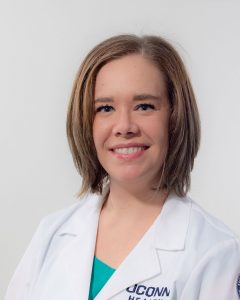As medicine continues to make advances in the treatment and prevention of HIV, UConn Health now has program specifically dedicated to reaching those who are not infected but are most at-risk.

Meiling Ortiz is a community health worker who joined UConn Health’s infectious diseases practice in August in the new role of PrEP navigator. PrEP stands for “pre-exposure prophylaxis,” which is medication in pill or injectable form that reduces a person’s chances of getting HIV.
While PrEP is not a new concept, Ortiz and Dr. Casey Godshall share a vision of an expanded and coordinated effort to connect the at-risk population to PrEP.
“It is vastly underutilized and it’s been that way for over a decade,” Godshall says. “Only about one-third of the number of people out there who could benefit from this tool actually receive it. There’s a lot of gender and race bias as well built in, so the people who are most often accessing it are those with more access to care, so they tend to be white or middle-class individuals. The underserved minority populations, more vulnerable populations and those who are actually at the highest risk of getting HIV, tend to not be able to access it.”
One of the goals of establishing UConn Health’s outpatient PrEP program is to shift the culture in health care away from the historical belief that HIV is an infectious diseases treatment problem, and redirect it more toward engaging other specialties and focusing more on prevention.
This is a challenging population with a lot of competing priorities in their lives. — Dr. Casey Godshall
Effective use of PrEP as a prevention tool does require a commitment on the part of patients. Not only do they have to consistently adhere to the prescription, they also need to see their physician regularly, and they need bloodwork – every three months – before they can get a refill, because they must remain negative for HIV in order for PrEP to be safe.
“I follow up with the PrEP patients, or I recruit new PrEP patients,” Ortiz says. “If they have any questions for the providers, if they have any concerns when it comes to PrEP, I will support them, especially when it comes to insurance coverages, preauthorizations. I also provide education about sexual health and medication.”
“And it’s really an essential role,” Godshall says. “This is a challenging population with a lot of competing priorities in their lives. The key to the whole program is Meiling’s role to track everybody. She is a contact person and a liaison for the provider, she assists the provider with reminders about refills and labs and appointments, but she also reminds the patient and educates the patient and counsels and keeps everybody in care and keeps everything in line.”
Backed by the U.S. Preventive Service Task Force, Medicaid covers PrEP, and is largely covered by private insurance, with assistance available for co-pays.
Ortiz says she’s found that as the people she talks to learn more about PrEP, they tend to be receptive to the idea.
“I start giving them pamphlets, I open that door, where I tell them, you want to enjoy your body, that’s understandable and your right to choose,” Ortiz says “But do you want to be safe? Do you want to protect yourself? It’s not hard to get them engaged so far.”

And many people realize, committing to being on PrEP beats the alternative.
“While we have come very far in treating HIV – we can get people healthy with undetectable viral loads, normal immune systems and a normal life expectancy – there are still many negative health outcomes associated with even well-controlled HIV, and we’re learning more and more about that as the years pass,” Godshall says.
The larger objective behind the program is to steer the health care system toward doing more to reach and empower those who can benefit the most from PrEP. It’s part of a broader initiative to for UConn Health’s HIV services to address not only the medical issues of those affected by HIV/AIDS, but also social determinants of health and primary prevention of HIV in at-risk individuals.
“The people who are not getting that information are the ones who are vulnerable, in so many ways, and so that’s just so low down on the health priority list for them,” Godshall says. “And yes, it you can say, ‘Just choose not to make risky sex choices,’ but I can tell you, people don’t make those choices. So we have to identify those who are putting themselves at risk, whether they know it or not, and we need to keep them safe. We need to do everything we can to give them the prevention tools and keep them on those prevention tools.”
In the program’s first few months, the gateway to the PrEP navigator has been exclusively through infectious diseases. Involving more specialties, such as internal medicine and gynecology, can help raise awareness by reaching more people, initiating conversations that previously might not have taken place outside of an infectious diseases office.
The Word Health Organization designated Dec. 1 as World AIDS Day starting in 1988. This year’s theme is “Take the rights path: My health, my right!”
Learn more about UConn Health’s Infectious Diseases Division.


